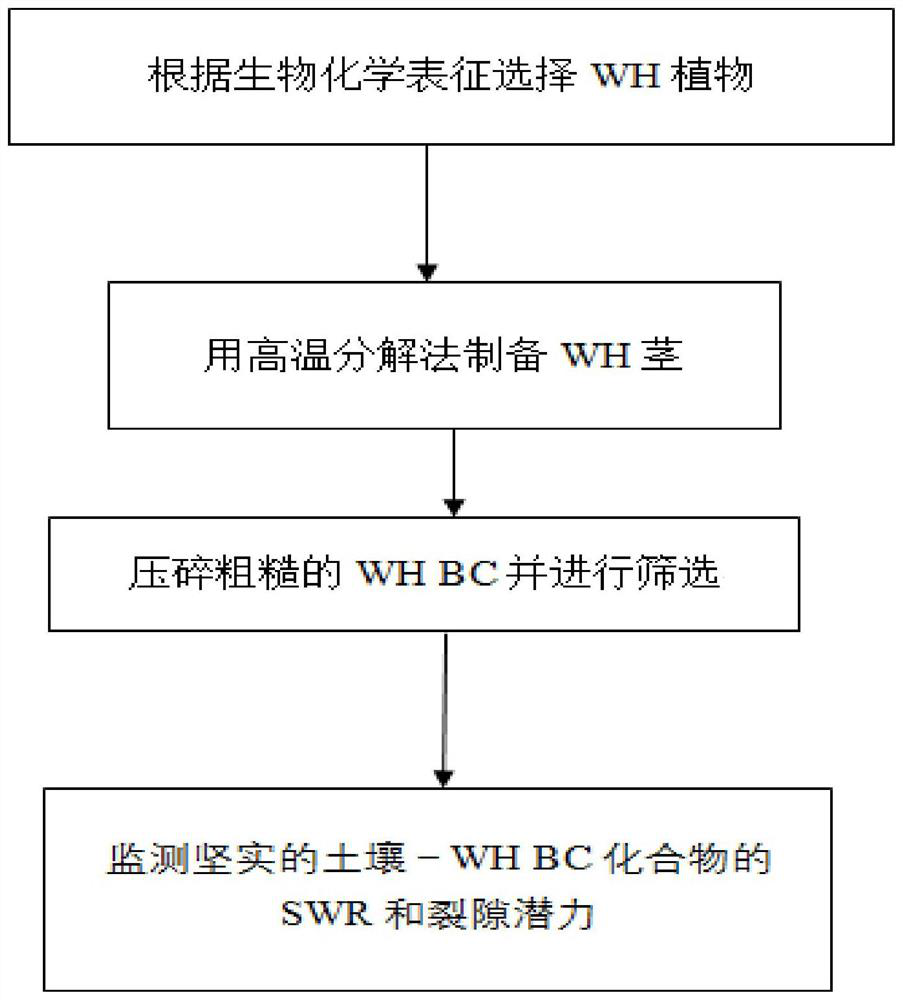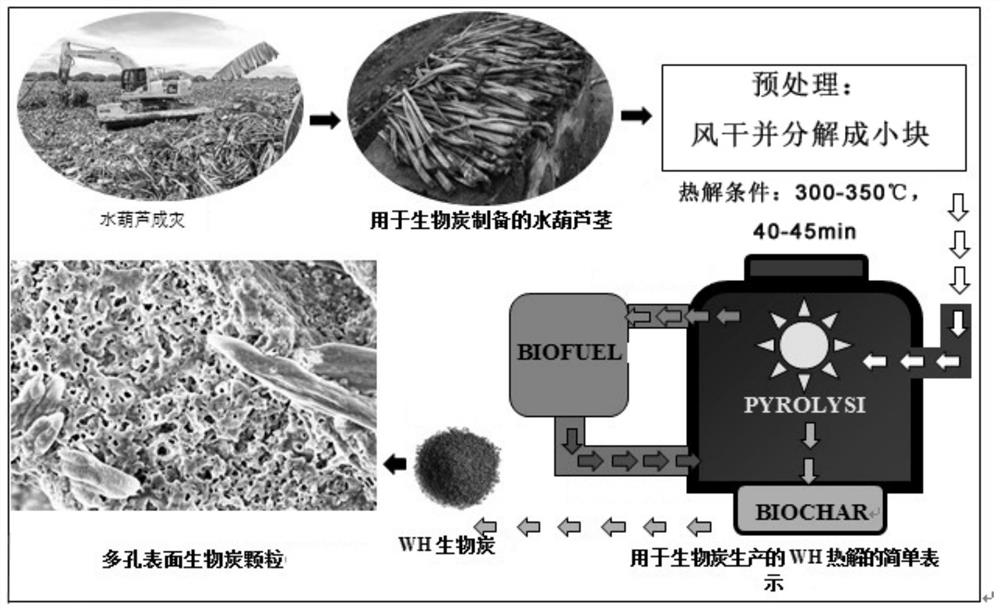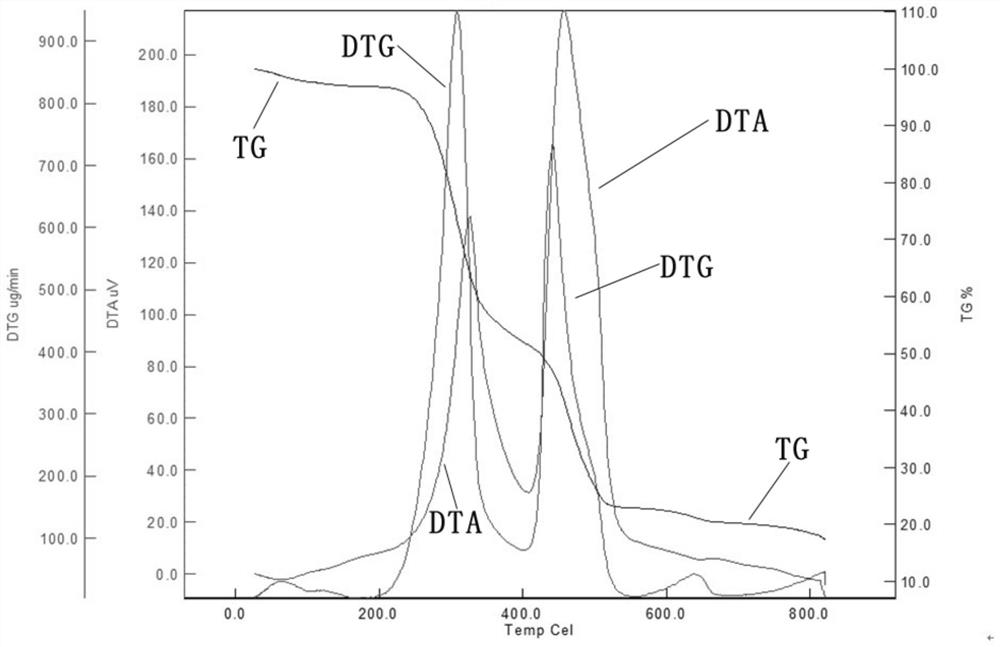A method of using water hyacinth to synthesize biochar to improve soil moisture and cracks
A technology for improving soil and synthetic organisms, applied in chemical instruments and methods, fertilizer mixtures, soil conditioning materials, etc., can solve problems such as clogging of river channels and irrigation systems, increased sediment deposition, biodiversity destruction, etc., and achieve low production costs. , the effect of simple process
Active Publication Date: 2020-11-10
SHANTOU UNIV
View PDF7 Cites 0 Cited by
- Summary
- Abstract
- Description
- Claims
- Application Information
AI Technical Summary
Problems solved by technology
It poses a series of serious threats to the ecosystem as its spread leads to the destruction of local biodiversity, increases sediment deposition, causes blockage of river courses and irrigation systems, hinders the development of irrigation projects, and becomes an Possible Measures for Greenhouse Gas Emissions from Water Bodies
Method used
the structure of the environmentally friendly knitted fabric provided by the present invention; figure 2 Flow chart of the yarn wrapping machine for environmentally friendly knitted fabrics and storage devices; image 3 Is the parameter map of the yarn covering machine
View moreImage
Smart Image Click on the blue labels to locate them in the text.
Smart ImageViewing Examples
Examples
Experimental program
Comparison scheme
Effect test
Embodiment
[0029] A method of using water hyacinth to synthesize biochar to improve soil moisture and fissures, such as figure 1 and figure 2 It mainly includes the following steps:
the structure of the environmentally friendly knitted fabric provided by the present invention; figure 2 Flow chart of the yarn wrapping machine for environmentally friendly knitted fabrics and storage devices; image 3 Is the parameter map of the yarn covering machine
Login to View More PUM
 Login to View More
Login to View More Abstract
The invention relates to a method for improving soil water and cracks by using biochar synthesized by using water hyacinth. The method mainly comprises the steps: (1) drying stems of the water hyacinth in the air, breaking the stems of the water hyacinth into small pieces, and then, carrying out pyrolysis under the conditions of oxygen insufficiency and high temperature; (2) crushing a rough waterhyacinth charcoal material obtained by pyrolysis by using an automatic crusher, and carrying out screening by using a screening device to obtain the water hyacinth charcoal material; and (3) mixing the water hyacinth charcoal material obtained in the step (2) and soil. The invention develops a novel application of harmful invasive weeds WH, the harmful invasive weeds are converted into BC by which it is possible that the SWR performance is improved and the soil crack potential is reduced, then, BC is mixed with the soil, and BC capable of improving the water retention and crack potential of engineering soil can be applied to the improvement of a geological environment such as a landfill covering material, a vegetable cover slope and an urban green infrastructure. The conversion from WH toBC is a more sustainable method for managing stubborn weeds in biochar-modified soil.
Description
technical field [0001] The invention relates to the field of biochar improving soil, in particular to a method for improving soil moisture and cracks by using water hyacinth to synthesize biochar. Background technique [0002] Water hyacinth (WH) is one of the most invasive weeds in the world. WH invades the water cover of most tropical countries in the world and reproduces at a very high rate (17.5 tons / ha / day), and various countries spend millions of dollars to control and eliminate its large blooms. It poses a series of serious threats to the ecosystem as its spread leads to the destruction of local biodiversity, increases sediment deposition, causes blockage of river courses and irrigation systems, hinders the development of irrigation projects, and becomes an Possible measures to release greenhouse gases from water bodies. The current conventional weed management strategies include physical or mechanical removal of waste biomass from water bodies on a regular basis, a...
Claims
the structure of the environmentally friendly knitted fabric provided by the present invention; figure 2 Flow chart of the yarn wrapping machine for environmentally friendly knitted fabrics and storage devices; image 3 Is the parameter map of the yarn covering machine
Login to View More Application Information
Patent Timeline
 Login to View More
Login to View More Patent Type & Authority Patents(China)
IPC IPC(8): C09K17/04
CPCC09K17/04Y02A30/60
Inventor 李安林鹏宋海红安娜包散塞思锐卡潘
Owner SHANTOU UNIV
Features
- R&D
- Intellectual Property
- Life Sciences
- Materials
- Tech Scout
Why Patsnap Eureka
- Unparalleled Data Quality
- Higher Quality Content
- 60% Fewer Hallucinations
Social media
Patsnap Eureka Blog
Learn More Browse by: Latest US Patents, China's latest patents, Technical Efficacy Thesaurus, Application Domain, Technology Topic, Popular Technical Reports.
© 2025 PatSnap. All rights reserved.Legal|Privacy policy|Modern Slavery Act Transparency Statement|Sitemap|About US| Contact US: help@patsnap.com



